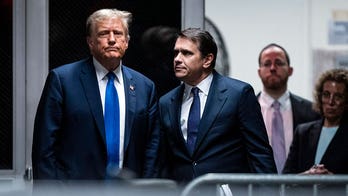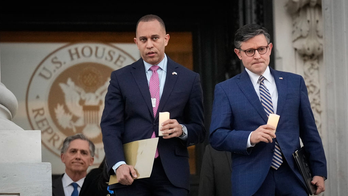Power Play 2/5/2013
Chris Stirewalt discusses immigration and budget deals with Susan Ferrechio, Debbie Dingell, Mark Kennedy and Peter Barnes
House Republicans on Tuesday kicked off one of Washington’s most active and intense rounds of debate over the illegal immigration issue, holding a hearing in which witnesses largely appealed to Congress to pass reform legislation to help families and improve the country’s struggling economy.
While some on Capitol Hill are pushing for a comprehensive immigration reform package, several House Republicans homed in Tuesday on a handful of policy changes they argued should take priority -- including improving the visa system for immigrants who graduate from American schools and dealing with illegal immigrants who came to the U.S. as children.
House Republican Leader Eric Cantor, during a policy speech Tuesday at the American Enterprise Institute, called for helping the youngest illegal immigrants while saying the debate must balance “respect for the rule of law and respect for those waiting to enter this country legally.”
“A good place to start is with the kids,” the Virginia congressman said. “One of the great founding principles of our country was that children would not be punished for the mistakes of their parents.”
Cantor also said he supports the Senate plan to make border security, employment verification and a workable guest-worker program part of the reform legislation.
Meanwhile, the House Judiciary Committee held a lengthy hearing, marking Congress’ first public debate on the issue since President Obama’s re-election and his second-term pledge to make comprehensive immigration reform a top priority.
“We can save the economy, and immigration is one of the ways to make it happen,” said Vivek Wadhwa, director of research at Duke University’s Pratt School of Engineering, during the hearing.
While the House held its hearing, Obama held separate White House meetings with labor and business leaders to discuss a wide range of issues, including immigration reform and how it fits into the broader economic picture.
“We had a great conversation with the president about immigration,” said Arne Sorenson, president of Marriott International. “We've got 11 million people in this country who are not sufficiently documented. They are not going home. We have got to do what we can quickly to make them contributing members of our economy and our society. It'll be good for our economy. … It will be good for their lives.”
Among the most high-profile speakers at the House hearing was Julian Castro, the Democratic mayor of San Antonio, Texas. He urged Congress to help those brought to the United States illegally by their parents and businesses that are helping train highly skilled immigrants, only to see them deported.
“The reforms that you have on the table are … pro-family and pro-business,” Castro testified. “Every year as competition increases, American companies throw up their hands, watch those trained in American universities leave in frustration.”
He also said visa laws that separate husbands and wives for years are “outdated” and “make no sense.”
While Obama and other Democrats have called for expedient and comprehensive reform, Republicans on Tuesday cautioned against passing legislation without a thorough debate.
“We all agree that our nation’s immigration system is in desperate need of repair,” said committee Chairman Bob Goodlatte, R-Va. “But before we rush to judgment, we need to carefully look at the current laws on the books to see what is and isn’t working. Reforming our nation’s immigration laws is a massive undertaking and is too important to not examine each piece in detail.”
His comments were followed those of Alabama Republican Rep. Spencer Bachus, who suggested passing separate legislation, instead of one comprehensive bill, that would first deal with getting high-skilled people working legally in this country.
“It’s going to be a much easier lift to solve the problem of high-skilled workers,” said Bachus, a subcommittee chairman. “We could pass a bill that would take that off the table. When you take compressive, full citizenship, that’s a more toxic contentious issue. ... Let’s not let the more contentious issue prevent us from this year, this month, passing something to address what is a horrible situation -- training people to go back to their countries and compete against us.”
At the same time, House Speaker John Boehner told reporters he was pleased with the bipartisan Senate effort on immigration, but the reform effort is “not a race. It's about trying to get it right.”
While the president and Senate panel each appear to want legislation that includes a path to citizenship, the congressional plan is more closely tied to tightening border security.
California Republican Rep. Darrell Issa complained Tuesday that the president’s plan calls for a path to citizenship without first securing borders.
“The president’s trying to go to the left of a bipartisan Senate deal,” he said. “And I think Republicans in the House are trying to figure what we can do on a bipartisan basis, or a partisan basis if necessary, that will help fix this problem, help people who want to be here and who can add to our economy.”
Meanwhile, New York Democratic Sen. Chuck Schumer has asked the U.S. Chamber of Commerce and the AFL-CIO to promptly reach an agreement on immigration that he and other members of the bipartisan Senate group can incorporate into their legislation.
The possibility of a guest-worker program has traditionally divided labor and business. Labor groups have looked askance on bringing in numerous low-wage workers, while that's an outcome businesses have favored.
Both sides appear hopeful, although Schumer and others say the issue scuttled the last attempt at a comprehensive overhaul of immigration law in 2007.
This time around, officials involved hope for a better result, in part because all involved see the clear necessity of addressing what's called "future flow" -- the influx of migrants to the U.S. that's sure to come whether or not Congress passes an immigration bill.
While Congress acts to provide a pathway to citizenship for the estimated 11 million illegal immigrants already in this country, it's just as important to deal with future immigration, advocates say. Otherwise, some time from now the country will once again find itself home to many more illegal immigrants.
"We're at a point where we have to take that issue really seriously and think about what kind of a system do we want to have in place so that 10 years from now, 15 years from now, we're not in the same situation," said Ana Avendano, assistant to the AFL-CIO president for immigration and community action.
The Chamber of Commerce "views the existence of a temporary worker program as vital to a comprehensive immigration bill," spokeswoman Blair Latoff Holmes said in a statement.
The U.S. does have several temporary worker programs already, but they're viewed as cumbersome and outdated, and experts say the majority of migrant workers in agricultural and other low-skill fields like landscaping or housekeeping are illegal.
For business and labor, the question is how to come to an agreement on how many workers to let in and under what circumstances, how much they would be paid, and whether and how they would be able to attain eventual permanent residency, the critical step toward citizenship.
"Few aspects of immigration law are so divisive in terms of where the two sides stand," said Demetrios Papademetriou, head of the nonpartisan Migration Policy Institute.
The Associated Press contributed to this report.





